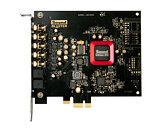Monday, January 18th 2021

Blast from the Past: Creative Announces Updated Sound Blaster Z SE Discrete Sound Card
Creative today has announced an updated to their Sound Blaster Z discrete sound card. The updated Sound Blaster Z SE keeps the up to 116 dB SnR and 24-bit/192 kHz sound of the sound card it updates, but adds 7.1 support for headphones and 5.1 discrete audio on speakers. The new dedicated sound card also features additional gaming profiles (it has specially-designed profiles for PUBG and Fortnite, for example), and new equalizer presets.
If you suppose most of these features could have been added via a software/firmware update, you'd be right; Creative is releasing most of these features via a software update for the Sound Blaster Z as well. Other specifications remain the same, with the Sound Blaster Z SE sound card featuring Creative's Sound Core 3D audio processor. Whether or not there is a requirement for discrete soundcards in this day and age of integrated sound quality is another discussion, as is the option for users to connect and process their audio via an external DAC.
Source:
Creative
If you suppose most of these features could have been added via a software/firmware update, you'd be right; Creative is releasing most of these features via a software update for the Sound Blaster Z as well. Other specifications remain the same, with the Sound Blaster Z SE sound card featuring Creative's Sound Core 3D audio processor. Whether or not there is a requirement for discrete soundcards in this day and age of integrated sound quality is another discussion, as is the option for users to connect and process their audio via an external DAC.



74 Comments on Blast from the Past: Creative Announces Updated Sound Blaster Z SE Discrete Sound Card
This kind of sound card will give you no advantage over what's included in a decent motherboard.
Probably the last good 7.1 card...
For years, I've been using digital out + ordinary DVD players and it made a world of difference. Then I bought a Dragonfly Red :cool:
This discussion changes a little if you also want to use a mic, though.
In that regard, I have a possibly silly setup with a Creative X3 external, which then goes Optical over to a Topping D90, to then output game audio to my headphones or speakers.
When I was still in broadcast radio we tried several different consumer and professional audio cards. In the actual broadcast studio PC's we ended up using pricey Audio Science because they had AES/EBU digital inputs and outputs for the Harris digital mixing boards. When it came to doing production work for broadcast the D2X was and still is my favorite audio card. Digital coaxial & SPDIF inputs and outputs, 7.1 audio and great sound quality. When combined with Sound Forge Pro 14.0 it's a Swiss Army knife of versatility.
Using an internal card will give you a rubbish noise floor because of all the interference inside the case and the shared power supply with the other components, so even if you use an high end chip and a good output stage it will give you poor results and those money you dump into the sound card would be better spent elsewhere.
If you care about having good sound it's better to just send the digital signal via usb or optical to an external device for the conversion to happen there.
It's fine if you want the internal card anyway but don't go around talking as if you know better when you don't understand the basics.
1. You can get lucky and get next to no interference when using a sound card. Not something I'd base my build on, but it can happen.
2. Past your twenties, your hearing dulls, even if there are some interferences, you may not spot them so easily.
Bonus caveat: if you don't have quality cans, interference is the least of your worries.
Most of the same effects can be done in software mind (see Creative Alchemy) but they have latency and cpu load, and you notice it at times.
I don't say this out of desire to knock you. This is a problem I have personally had across multiple builds, and took years to finally realize what was going on. I have actual science to back it up, but who am I vs anyone these days?
it sounded decent, but it lacked a dedicated headphone out and picked all the noise...
I cant live without my soundcard's front panel...
For, it was mainly one of my case's feature, the illuminated front logo, it run on high voltage and was transferring noise to the audio signal.
Lot's of cable managment and cleaning, and replaced every old fan as well...Well, it turns out my current card picks up external noise...
It has been fixed though...
All that said, I would buy a new SB card, a 7.1...
The whole debate of sound cards VS DACs is a more or less rubbish argument as the science of EMFi clearly defines that all electronics are affected equally by EMF and therefore filtering circuitry must be included to account for such. Quality design equals quality output. Rubbish design equals rubbish output. It is exactly that simple.